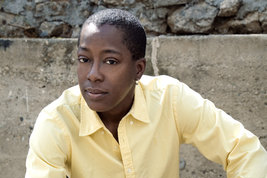Former Philadelphian Cheryl Dunye is receiving the Artistic Achievement Award for Directing at this year’s QFest on July 16, where she will also screen her new film, “The Owls. ” Her intriguing, astounding drama concerns a group of lesbians who shared success years ago and now shares relationship angst and a terrible secret. In a recent phone interview, Dunye spoke about “The Owls” and how she — and queer cinema — have changed over the years.
PGN: I love the term/title “Owl.” Where did you hear it/come up with it? CD: I was at [lesbian bar] The Lexington Room in San Francisco, and I started to chat up a cute 25-year-old bartender. She said, “Do you know what I hate the most? I hate it when a couple of owls come in and order Grey Goose martinis and leave me a dollar tip.” And I said, “What is an owl?” And she said, “An older, wiser lesbian, like you.” My eyes flipped!
PGN: Do you feel older and/or wiser? CD: We all represent a certain generation of lesbian identity and a relationship to this new queer identity. And this film explores that. I think that the New Queer Cinema came out at a time when there were a lot of dykes and lesbians, and there was not a lot of representation. New Queer Cinema bridged the indie world. Now we are at another moment and I feel this film brings these people together to talk about this moment, and the changes that are happening.
PGN: “The Owls” contains a comment about negativity and angst as things “we rarely talk about in cinema or [in] our lives.” Why did you want to address this? CD: I think that there needs to be more images [of lesbians] at different ages in their lives. So much queer cinema is about young love or hooking up. I’ve done my coming-out story. We are dealing with generational stuff here.
PGN: I was thrilled that you reunited V.S. Brodie and Guinevere Turner from “Go Fish.” How did you manage that? CD: The reunion happened by chance. I was originally trying to snag Silas Howard for the part, but Silas was unavailable. It was fortuitous that V.S. was visiting Guinevere and got tied in.
PGN: You talk in/about the film being made as/by a collective. Can you discuss the genesis of this? CD: There were a whole bunch of us going through this stuff — maybe not the personal politics I wear on my sleeve; I’m an extrovert. But there are those who feel queer cinema has more to offer, and isn’t offering it. We got to talking and said, “Let’s do something.” We pulled together finances, equipment and wherewithal. We don’t have to wait for a studio, or be approved to make a film. We’re trying to make a different kind of cinema. I’m going back to where I came from. This is the next level of the Dunye-mentary, which I started so many years ago, with my shorts and “The Watermelon Woman.”
— Gary Kramer

